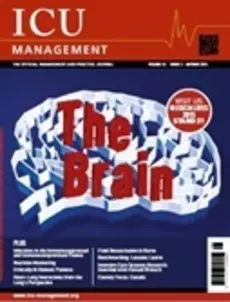Issues
ICU Volume 15 - Issue 3 - 2015
The Brain, Fluid Choices in Brain Injury, Sedation in Acute Brain Injury, ICU-Related Dysphagia, Cognitive Impairment After Critical Illness, Rapid Pathogen Testing with PCR/ESI-MS, Nutrition Monitoring, Critically Ill Diabetic Patients, Heart-Lung Interactions, Benchmarking, Critical Care in Canada
Tue, 29 Sep 2015

In this Issue
- Table of contents
- Editorial Board
- Download pdf (print optimised)
- Download pdf (screen optimised)
Editorial
The Brain
READ MORETreatment of neurological illnesses and complications in the intensive care unit remains a challenge. And as intensivists we are aware of the risks of cognitive impairment for many ICU patients. For our cover story this issue we address practical brain matters. Nino Stochetti explains how to choose fluids for brain injured patients to achieve t...
Book Review: The Organization of Critical Care
READ MOREThere are not many good books on this topic, and the present one includes contributions from North American and Australian experts in the field. The book has three main sections: organisation, improvement and integration, and a shorter fourth section on global and future perspectives. The list of topics is quite comprehensive, from ICU practitioners to computers, from quality to teamwork, from rationing to...
Cover Story
Fluid Choices in Brain Injury
READ MOREFluid management for acute brain damage has changed profoundly in the last decades. In the recent past brain oedema has been identified at autopsies as an overwhelming cause of raised intracranial pressure (ICP) and death after brain injury. In order to reduce the brain water content, dehydration, and even drastic dehydration, with 250 ml/day total, has been proposed for ICP...
Sedation in Acute Brain Injury: Less is More?
READ MOREOver the past decades, landmark interventional studies in general intensive1!care unit (ICU) patients have taught us that efforts to reduce the use of sedatives, by daily interruption (Kress et al. 2000; Girard et al. 2008), by not using sedatives as standard practice (Strøm et al. 2010), or by tapering sedatives to an awake but comfortable state (Mehta et al. 2012), lead to...
ICU-Related Dysphagia
READ MOREDue to malnutrition and aspiration dysphagia in critically ill patients on the ICU is an extremely important symptom with crucial impact on outcome and mortality. A broad variety of pathogenetic factors can lead to severe dysphagia in non-intubated and intubated patients followed by a significant delay in decannulation after weaning from the respirator has been completed. Th...
Series - Infections
Infections in the Immunosuppressed and Immunocompromised Patient
READ MOREOver the last decades the number of immunocompromised patients has increased in parallel with improvements in transplantation science and alongside the development of numerous new classes of immunosuppressive agents offering novel therapy for a wide range of diseases. For example, an estimated 114,690 solid organ transplants were performed globally in 2012 (Global Observatory...
Point-of-View
Cognitive Impairment After Critical Illness: Prevention and Treatment
READ MOREWhy did you decide to investigate NTF-prep? Long-term cognitive impairment after critical illness (CIACI) was first described in 1999 (Hopkins 1999). In 1992 we noticed that in cardiac surgery with extracorporeal circulation patients there was a correlation between jugular bulb lactic acid and cognitive decline. We concluded that CIACI was a re...
Clinical Benefits of Rapid Pathogen Testing with PCR/ESI-MS
READ MOREDr. Mark Wilks, Clinical Scientist, Microbiology at Barts Health NHS Trust in London, UK, talks about their experiences of using PCR/ESI-MS technology over a period of 18 months. During its use for the RADICAL study, the department also ran clinical samples of interest through the technology.Which patient groups could potentially benefit from the PCR/ESI-MS technology?...
Matrix
Nutrition Monitoring
READ MOREMost important when monitoring nutrition is to decide upon the nutritional goal for the individual patient. Technically nutrition balance, indirect calorimetry and blood chemistry are the cornerstones. To monitor nutrition is not complicated or difficult. What is more problematic is to monitor nutritional risk and to define the purpose or target for nutrition, especially in t...
Critically Ill Diabetic Patients
READ MOREThe Case for Liberal Glycaemic Management Background Several large randomised controlled trials (RCTs) have helped provide evidence to guide clinicians’ decisions about blood glucose management in critically ill patients. In two landmark single centre studies, investigators from Leuven reported a reduction in...
Heart-Lung Interactions from the Lung's Perspective
READ MOREIn this article we describe the characteristics of the interaction between lung protective ventilation and pulmonary and right ventricular function in ARDS. We highlight and discuss the concept that protective ventilation should be directed towards all components of the functional unit, and discuss how mechanical ventilation can modulate the interaction between them.The heart...
Fluid Resuscitation in Burns
READ MOREFollowing a severe burn injury, an overwhelming systemic inflammatory response with capillary leak syndrome is initiated, resulting in a combined hypovolaemic and septic shock (Malbrain et al. 2014a). Numerous articles regarding burn resuscitation have been published over the last decades; however, there is no universal consensus on how to achieve adequate resuscitation whil...
Management
Benchmarking: Lessons Learnt
READ MOREBenchmarking —comparing your own results with those of others—has the potential to reveal areas in which your unit could improve. However, there are pitfalls you should be aware of. When he was the CEO of Xerox Corporation, David T. Kearns stated, “Quality improvement can’t be measured in a meaningful way against standards of your own internal devising” (Kearns 199...
Interview
Intensive Care Systems Research-Interview With Associate Professor Hannah Wunsch
READ MOREHannah Wunsch is Associate Professor of Anesthesiology, Department of Anesthesia, University of Toronto, Canada. She is Staff Physician, Department of Critical Care Medicine, Sunnybrook Hospital; Senior Scientist, Trauma, Emergency & Critical Care Research Program, Sunnybrook Research Institute and Visiting Assistant Professor of Anesthesiology, Department of Anesthesiology, Columbia University, USA....
Country Profile
Critical Care in Canada
READ MOREInterview With Professor Claudio Martin, President, Canadian Critical Care Society Claudio M. Martin is President of the Canadian Critical Care Society. Dr. Martin is Professor in the Department of Medicine, Chair/Chief of Critical Care Western (Schulich School of Medicine and Dentistry, Western University) and Medical Director of Critical Care at London Health Sciences Centre in London, Ontario. What is th...
Agenda
Agenda
READ MOREOCTOBER 24-28 ANESTHESIOLOGY® 2015 Annual Meeting San Diego, USA www.asahq.org 25-26 ISF: 14th Colloquium: Precision Medicine in Sepsis Toronto, Canada http://internationalsepsisforum.com/colloquium/ 29-31 40th ANZICS/ACCCN ASM Auckland, New Zealand www.intensivecare.org.nzNOVEMBER 4-7 4th Euro-Asian Critical Care Meeting Ankara, Turkey www.yogunbakim2015.org/eng 5-6 Actualité...






















